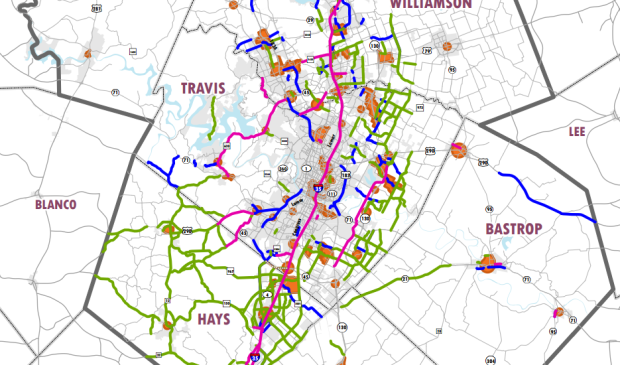CAMPO adopts 2040 Regional Transportation Plan
Tuesday, May 12, 2015 by
Tyler Whitson Austin’s history of doubling its population every 25 years or so presents a huge challenge to regional elected officials trying to predict the area’s future transportation needs. Despite this issue, the Transportation Policy Board of the Capital Area Metropolitan Planning Organization threw its chips on the table Monday when it adopted its 2040 Regional Transportation Plan.
Hays County Commissioner Will Conley, who chairs the board, said after the vote that there is “no perfect plan,” but that the adopted version is “a great plan for our region.”
The full board voted in favor of the plan, with the exception of Travis County Judge Sarah Eckhardt, who abstained.
Eckhardt said the plan “lacks discipline” and that, in order to manage expected growth, the board “really must do a better job of managing demand and including an expansion of transit.”
The plan includes about $35.1 billion in transportation spending and projects that the region’s population will grow to 4.1 million residents by 2040. “Vehicle travel in the region could double by 2040, while road capacity will only increase by an estimated 15 percent,” it reads.
The provision of the plan that prompted the most discussion is the MoPac South project, which will add as many as two variably tolled express lanes in each direction to MoPac Expressway between Cesar Chavez Street and Slaughter Lane.
The board amended the plan before adoption to add clarifying language to the project description. “Study all options for the proposed MoPac South expansion including both 1 and 2 express lanes in each direction as well as no-build,” reads the addition.
Council Member Ann Kitchen proposed the amendment to obtain assurance that the project’s sponsor, the Central Texas Regional Mobility Authority, will not rule out any alternative designs for the plan. “If this is something we’re doing, which we’ve said over and over and over again we’re doing,” she asked, “why don’t we write that down?”
MoPac South became a major issue after the mobility authority proposed a design in late February that includes two express lanes in each direction, an elevated two-lane platform over Lady Bird Lake and Zilker Park and a flyover that connects to Cesar Chavez adjacent to Austin High School.
City Council adopted a resolution Thursday asking that the board have the opportunity to consider other alternatives before the project moves forward, including those suggested by Transportation Department staff.
Mike Heiligenstein, executive director of the mobility authority, told the board that his organization will consider a “full range of studies.” He said CTRMA will ask transportation staff to provide it with a formal document outlining its proposed alternatives and will conduct a study on traffic and safety impacts near Cesar Chavez and Austin High School with the Center for Transportation Research at the University of Texas.
Heiligenstein also noted that the mobility authority plans to hold more public meetings regarding MoPac South, which will include community workshops leading up to another open house in late summer.
CAMPO Executive Director Ashby Johnson told the board that, once the mobility authority selects what it believes to be the best design for MoPac South, he would bring that item back to the board for concurrence before it can move forward.
“For major projects like this, I don’t think it’s my place to make that concurrence,” he said. “I think it’s this body’s place.”
Despite these assurances, the 2040 plan still states that the project will include “2 express lanes in each direction.”
Though that language does not necessarily mean the project must include so many lanes, Mayor Steve Adler sought to make that explicit by amending the language to read “up to, and including, 2 express lanes in each direction.”
That prompted an extensive discussion in which Travis County Commissioner Gerald Daugherty raised concerns that the Federal Highway Administration may not accept the language. If the administration were to reject the plan, he said, the region could fall out of compliance with federal law and face consequences.
Stating that he did not want to force his colleagues to take such a risk, Adler withdrew his amendment with the understanding that the board could amend the plan after it is passed and after having the opportunity to clear the language change with the administration.
Among the other projects that the 2040 plan lays out are $4.25 billion in improvements to I-35 in Travis, Williamson and Hays counties that include adding one lane in each direction on the highway as well as $605 million in improvements to supporting roads.
The plan also includes support for the Lone Star regional passenger rail project and a commuter rail line between Austin and Elgin, along with more intermodal facilities, additional express bus routes between cities, new bus rapid transit lines in Austin’s urban areas and more.
The board consists mainly of elected officials representing the region, which includes Travis, Bastrop, Burnet, Caldwell, Hays and Williamson counties. In addition to Adler and Kitchen, Council Members Delia Garza and Sheri Gallo represent the City of Austin on the board.
Federal regulations require that CAMPO update its regional transportation plan every five years. The 2035 Regional Transportation Plan is set to expire May 24.
Map of the 2040 Regional Transportation Plan Road Project with Centers courtesy of the Capital Area Metropolitan Planning Organization.
You're a community leader
And we’re honored you look to us for serious, in-depth news. You know a strong community needs local and dedicated watchdog reporting. We’re here for you and that won’t change. Now will you take the powerful next step and support our nonprofit news organization?









